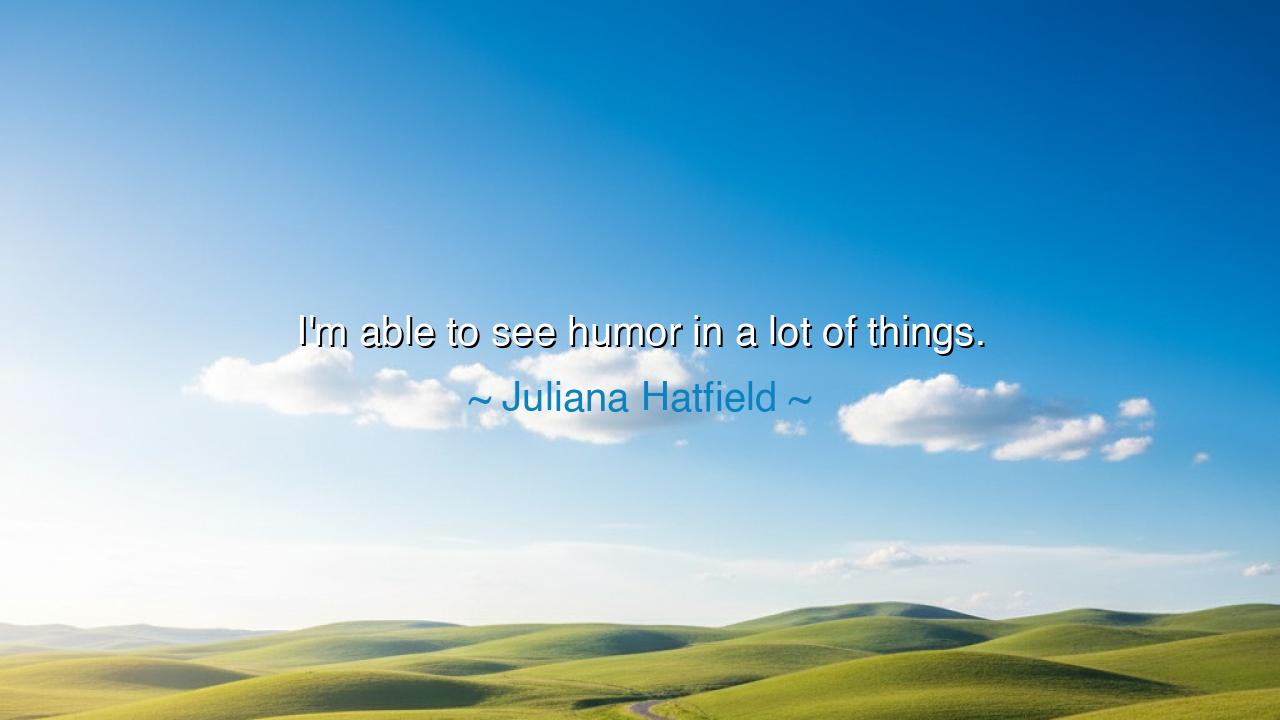
I'm able to see humor in a lot of things.






When Juliana Hatfield said, “I’m able to see humor in a lot of things,” she was not merely describing a personal trait, but expressing a profound philosophy of life. In her words dwells the quiet strength of those who have endured the world’s heaviness yet have refused to surrender their light. To see humor is to see beyond pain; it is to find a spark of grace hidden even in the dark corners of existence. Hatfield’s statement is simple, yet beneath its simplicity lies an ancient truth: that laughter, rightly understood, is not denial—it is resilience, the soul’s gentle rebellion against despair.
The origin of this reflection comes from Hatfield’s life as a musician and songwriter, one who has navigated the solitude, scrutiny, and intensity of creative life. Her journey, like that of many artists, has not been free of struggle, but she has carried through it a gift—the ability to perceive the absurd, the ironic, the beautiful contradictions of the human story. Her music often blends melancholy with wit, sorrow with brightness. So when she says she can “see humor in a lot of things,” she is not speaking of shallow amusement; she is describing a way of seeing—a lens that transforms suffering into meaning and fear into freedom.
To see humor in the world is to understand that life is not merely a sequence of tragedies, but a grand tapestry woven with irony and imperfection. The ancients understood this well. The philosopher Epictetus, who was once a slave, taught that we cannot control what happens to us—but we can control how we perceive it. When calamity strikes, he said, the wise man smiles, not in mockery, but in clarity. He sees that everything, even hardship, contains the seeds of comedy. For humor is born from contrast—from the strange meeting of hope and disappointment, of fragility and strength. It reminds us that we are not gods, but humans, stumbling through eternity with courage and folly intertwined.
Consider the story of Abraham Lincoln, a man who led his nation through civil war and unthinkable grief. Yet even amid the weight of death and division, he was known for his humor. He often told stories—sometimes absurd, sometimes self-deprecating—to lighten the hearts of those around him. One evening, when criticized for his appearance, he laughed and said, “If I were two-faced, would I be wearing this one?” That laughter, humble and human, was not frivolity—it was wisdom. Lincoln knew, as Hatfield does, that humor is the breath that keeps the spirit alive when the world seems intent on suffocating it.
To find humor in all things does not mean to belittle suffering, but to sanctify it. It is to acknowledge the chaos of life and still choose to dance within it. The mystics of old saw laughter as a form of enlightenment—the realization that even in tragedy, existence remains wondrous. The universe, vast and mysterious, does not bend to our plans, yet it rewards those who can laugh at their own smallness. This laughter is not scornful—it is tender. It says, “I am fragile, but I am free.” The one who can laugh in the face of misfortune has already transcended it, for they no longer fear its hold.
Juliana Hatfield’s insight, then, is an invitation to live with openness. The ability to find humor everywhere is not a gift of birth, but a discipline of the heart. It is cultivated by observation, by humility, by compassion. The more one listens, the more one sees the divine comedy within the human condition—the way ambition trips over itself, the way love stumbles yet endures, the way despair can turn, unexpectedly, into song. To see humor in life is to forgive it; to forgive life is to live it more fully.
So, my children of thought and feeling, learn from this wisdom: seek the humor that hides within hardship. When the world grows heavy, look for the absurdity that reminds you it is not all darkness. Laugh not out of cruelty, but out of clarity. When you fail, find the lesson that makes you smile; when others err, laugh with them, not at them. Let your laughter be a bridge, not a barrier. In doing so, you will discover what the ancients and the artists have always known—that humor is the echo of hope, the song the soul sings to remind itself that light is never lost.
And remember always: the one who can see humor in all things is not blind to pain—they are illuminated by perspective. Like Juliana Hatfield, cultivate eyes that see both the sorrow and the silliness of existence. For those who can laugh sincerely at life’s madness are not weak—they are wise. They have learned the final art of living: to hold both tears and laughter in the same open hand, and to see, in both, the sacred pulse of being alive.






AAdministratorAdministrator
Welcome, honored guests. Please leave a comment, we will respond soon